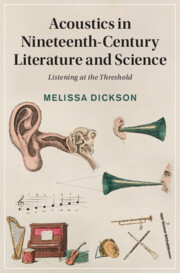Book contents
- Acoustics in Nineteenth-Century Literature and Science
- Cambridge studies in nineteenth-century Literature and culture
- Acoustics in Nineteenth-Century Literature and Science: Listening at the Threshold
- Copyright page
- Contents
- Figures
- Acknowledgements
- Introduction Whispers in the Roar
- Part I
- Part II
- Part III
- Chapter 6 Sounds of the Séance
- Chapter 7 Played upon or Player? Musical Mediums and Creative Inspiration
- Chapter 8 Dickens among the Spiritualists
- Part IV
- Conclusion
- Notes
- Select Bibliography
- Index
- Cambridge studies in nineteenth-century Literature and culture
Chapter 8 - Dickens among the Spiritualists
from Part III
Published online by Cambridge University Press: 13 December 2024
- Acoustics in Nineteenth-Century Literature and Science
- Cambridge studies in nineteenth-century Literature and culture
- Acoustics in Nineteenth-Century Literature and Science: Listening at the Threshold
- Copyright page
- Contents
- Figures
- Acknowledgements
- Introduction Whispers in the Roar
- Part I
- Part II
- Part III
- Chapter 6 Sounds of the Séance
- Chapter 7 Played upon or Player? Musical Mediums and Creative Inspiration
- Chapter 8 Dickens among the Spiritualists
- Part IV
- Conclusion
- Notes
- Select Bibliography
- Index
- Cambridge studies in nineteenth-century Literature and culture
Summary
It is well known that tales of the occult and the supernatural provided Charles Dickens with an ideal forum in which to explore the mysterious workings of the human mind, body, and nervous system. Although Dickens’s imaginative explorations of spectral encounters can be firmly tied to his preoccupation with the operations of the mind, this chapter demonstrates that Dickens nonetheless actively drew upon spiritualist modes of thought and practice in his writing. This is most notable, I argue, in Dickens’s meditations on the nature of the creative ‘spirit’ as a kind of presence to be overheard and in his use of sound in facilitating strange or seemingly supernatural experiences. A self-confessed voice-hearer and ghost-seer, Dickens frequently positions both himself and his characters, most especially those upon their deathbeds, as highly sensitive listeners, alert to, indeed eager to encounter, the possibilities of vibrations beyond the ordinary.
Keywords
- Type
- Chapter
- Information
- Acoustics in Nineteenth-Century Literature and ScienceListening at the Threshold, pp. 165 - 180Publisher: Cambridge University PressPrint publication year: 2024

